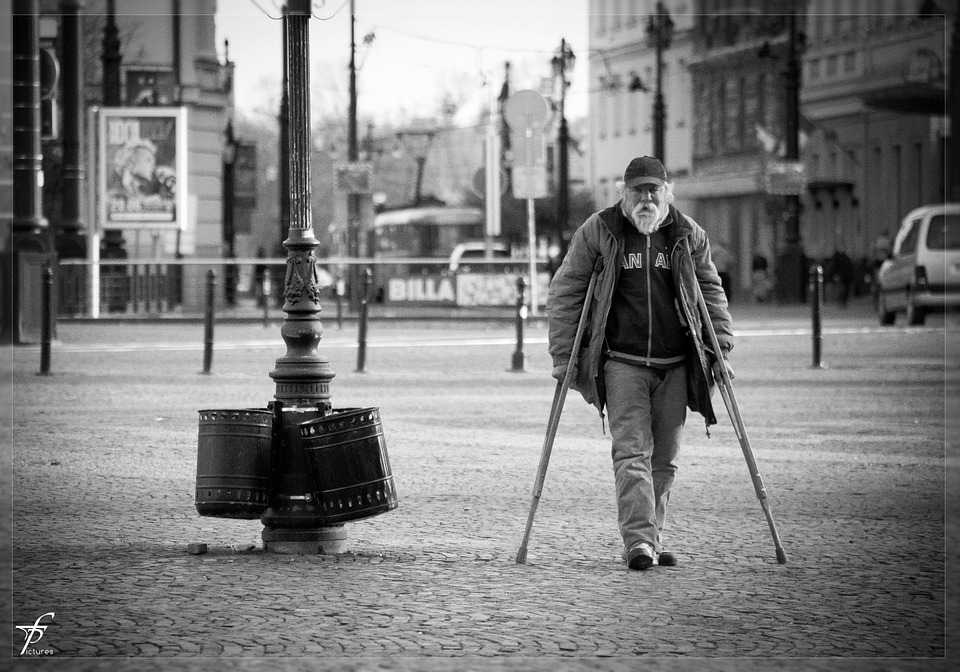Conditional Need
Need makes us nervous. No one wants to be ‘needy’. But something we may forget is that just because you need something at one point, doesn’t mean you will always need it.
Look at the much-maligned tool: the “crutch”. Why is it that people often wonder whether this valuable tool that allows us to heal, and to continue having a (more) useful life while we do so, is treated with suspicion? No one gripes about the crutch’s buddy the cast. We accept that the cast is there temporarily and allows a broken bone to heal straight, and we’ll stop using it as soon as we can. But somehow we act like people will continue using a crutch when they don’t need to. We even use the term “crutch” to cast the same aspersions on other tools that may help us like medications for physical or emotional pain, or help we get from other people. “It’s a crutch” implies that it’s unnecessary. First of all, that’s rarely true, and second, what’s your problem‽ If something helps you heal and makes your life better, that’s a good thing. Stop criticizing people who get the help they need!

As a culture, we waste a lot of effort trying to make people work for every bit of help they need. You need a special license or hang-tag to park in a handicapped space; permission to park closer to stores allows, for example, a friend of mine who was awaiting a heart-lung transplant and who literally could not walk across a wide parking lot, to run her own errands. Yet if you are not wrestling a wheelchair out of the back of your car, some jerks feel justified to yell at you for using a handicapped parking spot. No one can tell by looking at you what needs you may have, and too many seem to assume that everyone is ‘taking advantage’ of the system. But even worse that embracing nastiness toward others, we yell at ourselves.

Our ‘inner critics’ join the crowds of suspicious people in wondering whether we really need the help we know makes our lives easier. “Others manage without it” we think; or we wonder if we could be making ourselves weaker by not embracing more pain, more inconvenience? We worry if the help we get is depriving someone who needs it more. We share stories about those who have come through horrible challenges and become champions, which should be applauded. But it would be wrong to think those isolated cases mean that champions are made because of, rather than despite, misery. Think in terms of gardening, if you start your seeds in cold frames, and gradually harden them off, you’ll get a good crop of whatever you’re growing. If you just throw the seeds in the garden and let them take their chances, you’ll only get a very few, possibly stunted plants out of it. At very least they wouldn’t have the length growing season they need. It’s true that if you keep breeding the few hardy ones, you will get a hardy strain. But it may sacrifice flavor, color, taste and nutrients for that hardiness. Yes, it’s wonderful when someone overcomes adversity and succeeds anyway, but wouldn’t a better goal be to provide optimum conditions so that most of the people can succeed? (hint: including you!)
When you’re trying to heal, you could push yourself to get back to work as quickly as possible, but this could lead to relapse (which is, at very least, inconvenient and uncomfortable), or even a permanent disability. You also won’t do your normal work as well while sick, and you and those around you will have to deal with that too. So was “pushing it” heroic, or simply foolish? Toughing it out when you have no choice (choosing not to whine about what you can’t fix) is admirable. But refusing available help is counterproductive.

People often say “That which does not kill me makes me stronger.” I cry BS on that. What hurts you without finishing you off usually makes it easier for whatever hits you next to take you down. Get real! There’s a huge difference between (for example) giving a controlled amount of a neutralized virus to teach your body to respond effectively to an attacker, and just going out and exposing yourself to everything at once. It’s the difference between taking the stairs and jumping out the window to get down several flights. A bit at a time makes it doable. If you can get help, accept it. There’s nothing wrong with getting help when you need it. It’s efficient. It also helps others feel good about themselves (if you really need the help). Think about how irritating someone is who won’t wear their glasses or hearing aid- don’t be that person!
When you were born, you couldn’t walk, you couldn’t talk, you couldn’t get food or clean yourself. The only thing you could do was to show gratitude to those who did all these things for you. And while caring for a baby certainly prevented them from doing other things they might have done with their time and energy, most parents think that that it’s well worth it.
You no longer need the level of care you once did, because your parents gradually allowed you to take on more by yourself. Like plants in the cold frame, you got “hardened off”. If your parents were also dealing with more problems than they could handle, maybe they didn’t do it as well as they could have done, but as an adult who’s probably had to try to do more than is reasonable, you can probably accept their human limitations and let that go. *
So here’s the point. As afraid as we are to have needs, we do. We need to breathe several times a minute, we need to have our blood keep circulating (inside), we need to drink every day, we need to sleep, and eat enough on a fairly regular basis to stay healthy. We need to not be poisoned or injured beyond our ability to heal. We also need safety, affection, and esteem. Sometimes we are not able to meet these needs without help. Sometimes our needs change forever, other times we only need help temporarily; either way, we must rethink our assumption that needs are “bad”. When we get and give help, it often helps us build the affection, esteem and actualization that are less obvious, but still real, needs. Creating a community of mutual support helps those around us, and makes the world a better, safer, more pleasant place to live. When you are going through a period of need, accept the reality, and try to see the less obvious benefits, and don’t assume that your needs will always be the same.
*Or not- this is the sort of thing that can send us back seeking spirits from other lives repeatedly as we try to work out old issues- good luck with that if that’s you.
